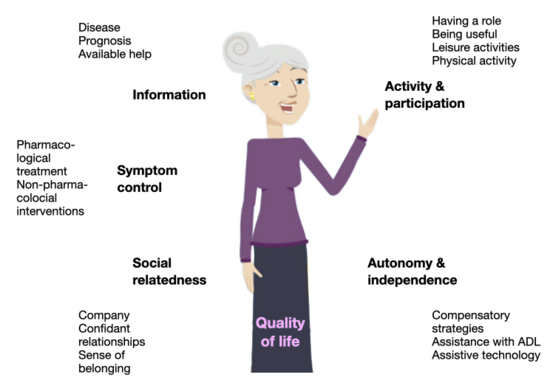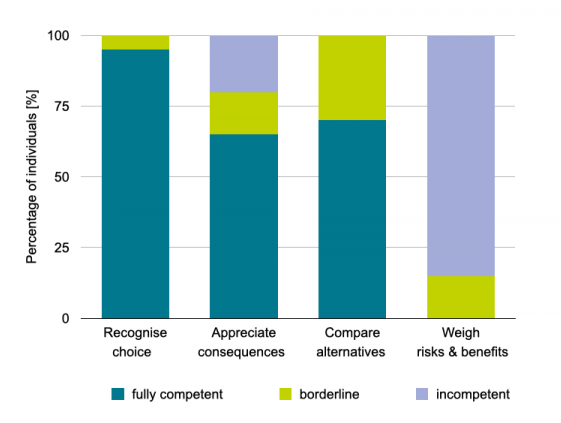Person at the centre
What are major needs of people with dementia?
People with dementia have the same needs as everyone else. Their needs are diverse and vary greatly from person to person. Five basic needs can be identified:
- Self-determination and autonomy
- Information.
- Well-being
- Activity and social participation.
- Community.
The basic needs do not change significantly during the course of dementia, but it becomes more difficult for those affected to fulfill them independently. Interventions that are geared towards the needs of people with dementia help to improve their quality of life.
Meeting needs improves quality of life
Stage | Type of need | |||
Information | Treatment & care | Psychosocial | Physical | |
| Early | Disease Prognosis Available services Financial support Advance directives | Antidementia drugs Non-pharmacological interventions Assistive technology Comorbidities | Activity Participation Being useful Having a role | Exercise |
| Middle | Available services Help with transitions | Memory aids ADL assistance Behaviour management Mobility Self-care Safety Assistive technology | Activities Emotional support Social contact Relationships Acceptance Preservation of identity Spiritual support | Basic nursing Nutrition Exercise |
| Late | Physical wellbeing Pain management | Comfort Safety Company | Basic nursing Hygiene Nutrition Sleep | |
Can people with dementia participate in decision-making?
The ability to evidence a choice and making the reasonable choice is unimpaired at the stage of mild dementia. However, complex appreciation, reasoning and understanding are already compromised. The ability to provide complex consent rapidly declines over time. This shows that people with dementia need to be involved in decision-making at an early stage. Moreover, decisions and choices must be presented in a simple, understandable way and step-by-step.
What are the major needs of informal carers?
The major needs of (family) carers of people with dementia include information (about diagnosis, prognosis, treatment options and available services, organising and financing care), strategies for dealing with problem behaviours of the person with dementia (apathy, aggressiveness, irritability and others), ways of coping with own difficult emotions (anger, distress, loneliness, grief, depression), advice for managing the change in roles and relationships (novel tasks, role conflict, loss of mutuality and closeness) and coaching on communication.
Stage | Type of need | ||
Information | Treatment | Psychosocial | |
| Early | Receiving a diagnosis Symptoms and progression Dealing with memory loss Access to services Meaningful activities | Accepting the diagnosis Dealing with changing roles and relationship | Carer support group Assistance with housekeeping Home helpers Assistive technology |
| Middle | Managing behavioural problems (agitation, irritability, apathy) Dealing with physical symptoms (nutrition, hygiene, incontinence) | Dealing with own emotional problems (guilt, anger, grief) Role conflict Pursuing own interests Fighting isolation | Own health problems Financing care Safety issues Environmental modification Respite care Adult day care |
| Late | Nursing home admission Choosing appropriate institution End-of-life care | End-of-life decisions | Accessible and affordable facilities |
Meeting complex needs requires a care plan
Needs do not arise all at one time, and they change considerably during the course of dementia. Interventions need to be planned and coordinated in order to come at the point of need and take advantage of synergies. Ideally, the professionals involved should work together to create an individual care plan that takes into consideration individual needs related to gender, ethnicity, age, level of education, previous lifestyle and physical health. The care team should be led by a physician (e.g. the GP), nurse or social worker.
Meeting complex needs requires a team and a plan
Collaboration pays
Working as a team requires some extra efforts and time of professionals, but it is likely to pay in terms of greater treatment efficacy, less requirement of repeat visits and crisis management, and greater treatment satisfaction on the part of people with dementia and carers. Working together provides benefits for everyone involved.
References
- Hancock GA, Woods B, Challis D, Orrell M. The needs of older people with dementia in residential care. Int J Geriatr Psychiatry 21: 43-49, 2006
- Hansen A, Hauge S, Bergland A. Meeting psychosocial needs for persons with dementia in home care services – a qualitative study of different perceptions and practices among health care providers. BMC Geriatr 17: 211, 2017
- Kerpershoek L, de Vugt M, Wolfs C, Woods B, Jelley H, Orrell M, Stephan A, Bieber A, Meyer G, Selbaek G, Handels R, Wimo A, Hopper L, Irving K, Marques M, Goncalves-Pereira M, Portolani E, Zanetti O and Verhey F. "Needs and quality of life of people with middle-stage dementia and their family carers from the European Activcare Study. When informal care alone may not suffice." Aging Ment Health 25: 1-6, 2017
- Khanassov V, Vedel I. Family physician-case manager collaboration and needs of patients with dementia and their caregivers: a systematic mixed studies review. Ann Fam Med 14: 166-177, 2016
- Miranda-Castillo C, Woods B, Orrell M. The needs of people with dementia living at home from user, caregiver and professional perspectives: a cross-sectional survey. BMC Health Serv Res 13:43, 2013.
- Rosa E, Luissignoli G, Sabbatini F, Chiappa A, Di Cesare S, Lamanna L, Zanetti O. Needs of caregivers of the patients with dementia. Arch Gerontol Geriatr 51: 54-58, 2010
- Schmid R, Eschen A, Rüegger-Frey B, Martin M. Instruments for comprehensive needs assessment in individuals with cognitive complaints, mild cognitive impairment or dementia: a systematic review. Int J Geriatr Psychiatry 27: 329-341, 2011
- Shuman SB, Hughes S, Wiener JM, Gould E. Research on care needs and supportive approaches for persons with dementia. Washington, US Department of Health & Human Services 2017
- Van der Roest, HG, Meiland FJ, Comijs HC, Derksen E, Jansen AP, van Hout HP, Jonker C. and Dröes RM. What do community-dwelling people with dementia need? A survey of those who are known to care and welfare services. Int Psychogeriatr 21: 949-965, 2009
- Von Kutzleben M, Schmid W, Halek M, Holle B and Bartholomeyczik S. Community-dwelling persons with dementia: What do they need? What do they demand? What do they do? A systematic review on the subjective experiences of persons with dementia. Aging Ment Health 16: 378-390, 2012



